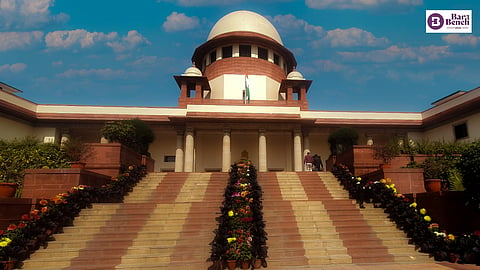
- Latest Legal News
- News
- Dealstreet
- Viewpoint
- Columns
- Interviews
- Law School
- Legal Jobs
- हिंदी
- ಕನ್ನಡ

The Supreme Court on July 15 allowed a review petition filed by a mother against an earlier order awarding permanent custody of her 12-year-old son to his biological father, citing fresh psychological evidence of distress and anxiety caused to the child by the prospect of separation.
A bench of Justices Vikram Nath and PB Varale heard the matter in open court and held that its earlier decision upholding a Kerala High Court order favouring the father had failed to account for the serious psychological harm caused to the child. It reinstated the mother’s custody and modified the visitation rights of the father.
“We cannot turn a blind eye to the trauma that is being inflicted on the child in consequences of the orders of the courts of law handing custody to the father,” the bench said.
The Court added that while review jurisdiction must be exercised sparingly, the child’s deteriorating mental health due to the earlier judgment amounted to a “substantial and compelling” reason for judicial interference.
“There is no room for doubt that in matters of custody, the best interest of the child remains at the heart of judicial adjudication and a factor adversely impacting the child’s welfare undeniably becomes a matter of such nature that has a direct bearing on the decision with the possibility to change it,” it held.
The parties in the case had divorced by mutual consent in 2015, with custody of their son granted to the mother. She subsequently remarried and began living with her husband and his two children from a previous marriage. A third child was later born out of this second marriage.
In 2019, the mother expressed her intent to relocate abroad along with the minor child in order to join her husband who had secured employment in Malaysia.
The father opposed the move and approached the family court seeking permanent custody, also alleging that the child’s religion had been changed from Hinduism to Christianity without his knowledge or consent. In October 2022, the family court dismissed the father’s claim for custody and reaffirmed custody with the mother.
On appeal, the Kerala High Court reversed this decision and granted custody to the father. The mother’s challenge to the High Court’s order was dismissed by the Supreme Court in August 2024, following which she filed a review petition supported by clinical reports from the Psychiatry Department of CMC Vellore.
The reports warned of “high risk for separation anxiety disorder” and “significant anxiety” in the child, recommending that he not be separated from his current family environment.
Taking note of these findings, the Supreme Court held that the change in custody had caused a “calamitous effect” on the child’s mental health and had to be reconsidered in light of the new factual developments that were not previously on record.
“There is nothing on record to reflect that the petitioner’s subsequent marriage or the birth of the second child has, in any manner, altered her level of motherly devotion to the minor in question,” the Court observed.
The bench also rejected the argument that the psychological reports were biased as they relied on information provided by the mother and stepfather.
The Court noted that four independent assessments over a span of seven months all confirmed the child’s distress.
It warned that transferring custody to the father would disrupt the child’s settled life and remove him from the emotional and physical environment where he felt secure and nurtured.
“The change in permanent custody shall also essentially amount to upending the very core of the stable and familiar environment in which the child currently lives and prospers,” the bench said.
It emphasised that the child’s primary family - including his mother, stepfather and half-brother - was a secure and loving environment.
“The essential feature is that a secure, supportive and loving family forms the bedrock of a healthy childhood experience and helps one grow into a balanced, positive and confident adult,” the Court noted.
At the same time, the Court acknowledged the biological father’s desire to be involved and allowed structured visitation. It permitted weekly physical meetings and virtual interactions twice a week, but denied overnight stays for the time being.
The Bench directed that the child’s counselling should continue and that the father should also participate in sessions to build a relationship gradually. It warned that any future change in visitation rights would be subject to the child’s comfort and progress as assessed by professionals.
“A father-son relation can only be fostered patiently over the course of years, marked by his continued presence and responsibility-bearing attitude, and nurtured with boundless love, care and empathy,” the Court said.
It also cautioned both parents to not let past bitterness interfere with the child’s welfare.
The Court noted that the petitioner had alleged threats by the father to take away the child. While it refrained from ruling on this allegation due to lack of evidence, it cautioned the father against any kind of insensitive or crude remarks in future.
Thus, the Court restored the mother’s custody and reinstated the family court’s 2022 judgment with modified visitation arrangements. It also directed the family court to avoid calling the child to court unless absolutely necessary.
The petitioner was represented by Senior Advocate Liz Matthew along with advocates Vishnu Sharma AS and Bhagavathy Vennimalai.
The respondent was represented by Senior Advocate Kiran Suri along with advocates SJ Amith, Aishwarya Kumar and Vipin Gupta.